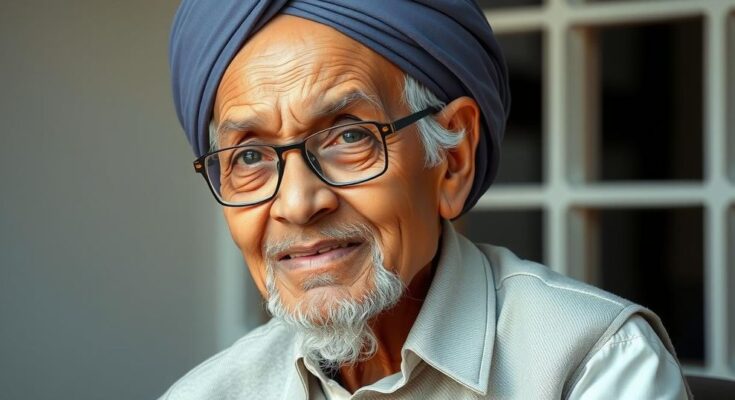Former Indian Prime Minister Manmohan Singh passed away at 92. He served from 2004 to 2014, known for driving economic reforms and facing political controversies. Singh, educated at prestigious universities, transformed India’s economy during his tenure as finance minister. His leadership was marked by significant achievements in international relations and domestic policies, but also by challenges, including corruption allegations. He is survived by his wife and three daughters.
Former Prime Minister Manmohan Singh of India, who served between 2004 and 2014 and is renowned as a pivotal figure in the nation’s economic reforms, has passed away at the age of 92. Singh, a distinguished economist and politician, was admitted to a Delhi hospital due to deteriorating health. He is remembered not only for his tenure as India’s longest-serving prime minister but also for being the first Sikh to hold the position and the first to be re-elected after a full term since Jawaharlal Nehru.
Born on September 26, 1932, Singh’s early life in a rural area of Punjab was marked by poverty and hardship. He overcame these challenges, earning a master’s degree at the University of Cambridge and a DPhil at Oxford University. He initially made his mark as Finance Minister in 1991 when he introduced significant reforms to rescue the economy from looming bankruptcy, including tax cuts and encouraging foreign investment, which laid the foundation for rapid economic growth in the subsequent years.
Singh’s rise was not without controversy; he struggled with a lack of political clout and faced allegations of corruption during his second term, which weakened his party’s standing in the 2014 elections. Despite criticisms regarding his leadership style, characterized as soft and indecisive, he managed to engage in pivotal diplomatic efforts, notably with the United States and Pakistan, emphasizing pragmatic foreign relations, including a landmark nuclear agreement.
Post-premiership, Singh remained active within the opposition Congress party, advocating for economic assistance amid crises. His legacy is multifaceted; he is honored for his contributions to India’s economic standing yet scrutinized for political challenges faced during his administration. Singh is survived by his wife and three daughters.
Manmohan Singh was an influential figure in Indian politics, particularly recognized for his role in liberalizing the economy during the 1990s. His tenure as finance minister marked a critical evolution in India’s economic policies, transitioning the country towards more open market practices. After serving as prime minister, his administration faced challenges that shaped the political landscape, including corruption scandals that influenced subsequent elections. Understanding his personal background as well as his academic and political journey provides insight into his legacy as a leader who significantly impacted India’s economy and foreign relations.
Manmohan Singh’s death marks the end of an era for Indian politics, characterized by substantial economic reforms and challenges. His life story illustrates a remarkable journey from modest beginnings to the pinnacle of political power in India. Singh’s legacy will reflect both his achievements in economic revitalization and the political complexities he navigated, earning a place in history as a transformative leader. His contributions remain a significant aspect of contemporary discussions on India’s development and governance.
Original Source: www.bbc.com




